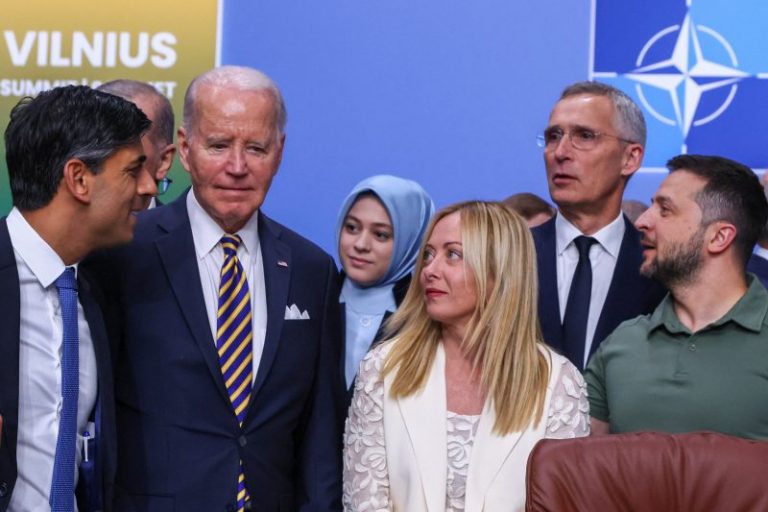One day after President Biden visited Kyiv in February to reiterate American support for Ukraine, Italian Prime Minister Giorgia Meloni made the same trip on the train tracks from Poland. As she passed where the president had just been, Meloni’s team contacted Biden’s to ask if the leaders might debrief each other.
They spoke by phone, and during their friendly exchange, the president invited Meloni on another unexpected trip: to visit him at the White House.
The two leaders are now set to meet Thursday, further solidifying an unexpected relationship that has emerged between Biden, who has stressed an agenda of democracy and tolerance, and Meloni, Italy’s first far-right leader since the end of World War II. The Ukraine conversation, described by a senior administration official who spoke on the condition of anonymity to share private discussions, highlighted a connection the two have formed over standing up to Russia and China.
The relationship is all the more notable since it comes after Biden publicly expressed doubts about Meloni’s policies as she rose to power. At a Democratic Governors Association fundraiser in September, Biden raised concerns about the trajectory of Rome under Meloni’s reign, comparing it to other threats against democracy throughout the globe.
“You just saw what’s happened in Italy in that election,” Biden said. “You’re seeing what’s happening around the world. And the reason I bother to say that is, we can’t be sanguine about what’s happening here, either.”
Those familiar with the two leaders say they found a connection over the course of several encounters since Meloni took office. During their first meeting — at a summit of the Group of 20 nations last November in Bali — their conversation ran longer than expected, according to an Italian official familiar with the discussions who spoke on the condition of anonymity to discuss private talks.
The two seemed to have an in-depth conversation, the official recalled. At summit of the Group of 7 leading democracies last May in Hiroshima, some were surprised when photos captured the two holding hands. At another meeting, for NATO leaders, they exchanged a hug.
“There was a chemistry between the two, more than people realize,” the Italian official said.
At Thursday’s meeting, Biden and Meloni are expected to discuss supporting Ukraine, developments in North Africa, their coordinated response to China and Italy’s upcoming presidency of the G-7, the White House said.
“There’s a good, productive relationship here,” National Security Council coordinator John Kirby said Wednesday. “President Biden is very much looking forward to the discussion.”
Diplomats say Biden and Meloni will probably avoid a public emphasis on their political disagreements, although those differences will in a sense hang over the day’s events. Meloni’s government, which includes several far-right firebrands, has imposed restrictions on the parental rights of same-sex couples, for example, and lifted coronavirus vaccine requirements for health-care workers.
A U.S. official conceded that the leaders’ domestic agendas are far apart, noting that Biden does not believe LGBTQ+ people should be discriminated against and saying Washington has spoken with Rome about human rights. But Thursday’s meeting will focus on foreign policy, the official said.
Kirby sidestepped questions in a White House news briefing about the political distance between the leaders, emphasizing the issues they agree on and adding that he did not want to get ahead of their discussion. Kirby also said the United States respects the decision of Italian voters.
“The Italian people get to decide who their government is,” Kirby said. “They’re a democracy.”
While Meloni’s campaign appealed to her right-wing constituency, her government has taken a more centrist approach, Italian political analysts say. Notably, unlike other hard-right figures across Europe, including Hungarian Prime Minister Viktor Orban and French nationalist Marine Le Pen, she has taken a tough stance against Russian President Vladimir Putin’s invasion of Ukraine.
“It’s like dealing with two different personalities,” said Carlo Bastasin, a foreign policy senior fellow at the Brookings Institution. “Meloni, before winning the election, was extremely polarizing and extremely radical in her position, so she raised a lot of concerns.”
Meloni’s right-wing campaign message attracted strong domestic support, but the international community was unsure how she would fare on the world stage. In September, when it appeared Meloni could be the next prime minister, one Biden senior administration official told reporters that they would wait to see how she governed. At the same time, the official dismissed doomsday theories about Italy spiraling into fascism.
“I don’t want to predict or characterize because there’s so many uncertain variables,” the official said at the time. “What I will say is this: We do not believe that, no matter how this turns out, Italy is somehow going to drop out of the Western coalition of countries supporting Ukraine, and I don’t think our key partners in Europe believe that either.”
Time has borne that out. Since taking office, Meloni has made noteworthy contributions to international efforts to support Ukraine and provide aid to Tunisia, said Stefano Stefanini, senior fellow at the Atlantic Council and former diplomatic adviser to Italian President Giorgio Napolitano. She also has signaled a willingness to withdraw from China’s Belt and Road infrastructure program, a move that would no doubt please Washington as it has created its own alternative global infrastructure investment program.
“While Meloni is a work in progress as a stateswoman,” Stefanini said, “she has proved an international personality that is stronger than expected.”

